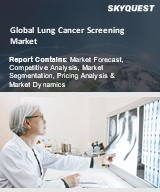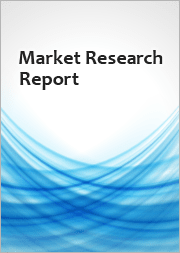
|
시장보고서
상품코드
1622408
비소세포폐암 시장 규모, 점유율, 성장 분석 : 유형별, 치료법별, 최종 이용 산업별, 지역별 - 산업 예측(2025-2032년)Non-Small Cell Lung Cancer Market Size, Share, Growth Analysis, By Type (Adenocarcinoma, Squamous Cell Carcinoma), By Treatment (Chemotherapy, Targeted Therapy), By End-Use Industry, By Region - Industry Forecast 2025-2032 |
||||||
비소세포폐암 시장 규모는 2023년 269억 4,000만 달러로 평가되며, 2024년 306억 8,000만 달러에서 2032년 869억 4,000만 달러로 성장할 것으로 예상되며, 예측 기간(2025-2032년) 동안 13.9%의 CAGR로 성장할 것으로 예상됩니다.
면역관문억제제(ICI)가 1차 치료제로 도입되면서 비소세포폐암(NSCLC) 분야의 시장 매출 성장이 크게 촉진되고 있습니다. 전 세계 폐암 환자의 80-85%를 차지하는 비소세포폐암의 높은 유병률은 주요 기업들이 혁신적인 치료법을 개발하고 기존 치료제의 효능을 개선하는 데 집중하도록 유도하고 있습니다. 이러한 성장세는 폐암이 전 세계 암 관련 사망의 주요 원인이라는 평가와 함께 비소세포폐암 진단 건수의 증가와 선진국과 신흥국 모두에서 사회적 인식이 높아지면서 시장 역동성을 더욱 증폭시키고 있습니다. 또한, 비소세포폐암 치료제를 파이프라인에 포함시키려는 주요 시장 기업들의 노력과 연구개발에 대한 투자 증가도 세계 시장 확대에 중요한 요인으로 작용하고 있습니다.
목차
소개
- 조사 목적
- 조사 범위
- 정의
조사 방법
- 정보 조달
- 2차 데이터와 1차 데이터 방법
- 시장 규모 예측
- 시장 가정과 제한
주요 요약
- 세계 시장 전망
- 공급과 수요 동향 분석
- 부문별 기회 분석
시장 역학과 전망
- 시장 개요
- 시장 규모
- 시장 역학
- 성장 촉진요인과 기회
- 성장 억제요인과 과제
- Porters 분석
주요 시장 인사이트
- 핵심성공요인
- 경쟁 정도
- 주요 투자 기회
- 시장 생태계
- 시장 매력 지수(2024년)
- PESTEL 분석
- 거시경제 지표
- 밸류체인 분석
- 가격 분석
- 규제 상황
- 사례 연구
- 기술의 진보
비소세포폐암 시장 규모 : 유형별
- 시장 개요
- 선암
- 편평상피암
- 대세포암
- 대세포 신경내분비종양
비소세포폐암 시장 규모 : 치료법별
- 시장 개요
- 화학요법
- 표적요법
- Bevacizumab
- Necitumumab
- Ramucirumab
- 면역요법
- Nivolumab
- Atezolizumab
- 기타
비소세포폐암 시장 규모 : 최종 이용 산업별
- 시장 개요
- 병원
- 홈케어
- 전문 클리닉
- 기타
비소세포폐암 시장 규모
- 북미
- 미국
- 캐나다
- 유럽
- 독일
- 스페인
- 프랑스
- 영국
- 이탈리아
- 기타 유럽
- 아시아태평양
- 중국
- 인도
- 일본
- 한국
- 기타 아시아태평양
- 라틴아메리카
- 브라질
- 기타 라틴아메리카
- 중동 및 아프리카
- GCC 국가
- 남아프리카공화국
- 기타 중동 및 아프리카
경쟁 정보
- 상위 5개사의 비교
- 주요 기업의 시장 포지셔닝(2024년)
- 주요 시장 기업이 채용한 전략
- 시장의 최근 동향
- 기업의 시장 점유율 분석(2024년)
- 주요 기업 개요
- 기업 개요
- 제품 포트폴리오 분석
- 부문별 점유율 분석
- 매출 전년비 비교(2022-2024)
주요 기업 개요
- F. Hoffmann-La Roche Ltd.(Switzerland)
- AstraZeneca(United Kingdom)
- Bristol-Myers Squibb Company(United States)
- Merck & Co., Inc.(United States)
- Novartis AG(Switzerland)
- Pfizer Inc.(United States)
- Takeda Pharmaceutical Company Limited(Japan)
- Bayer AG(Germany)
- Eli Lilly and Company(United States)
- GlaxoSmithKline plc(United Kingdom)
- Sanofi(France)
- AbbVie Inc.(United States)
- Johnson & Johnson(United States)
- Gilead Sciences, Inc.(United States)
- Amgen Inc.(United States)
- Boehringer Ingelheim GmbH(Germany)
- Daiichi Sankyo Company, Limited(Japan)
- Astellas Pharma Inc.(Japan)
- Biogen Inc.(United States)
- Regeneron Pharmaceuticals, Inc.(United States)
결론과 추천사항
ksm 25.01.14Non-Small Cell Lung Cancer Market size was valued at USD 26.94 Billion in 2023 and is poised to grow from USD 30.68 Billion in 2024 to USD 86.94 Billion by 2032, growing at a CAGR of 13.9% during the forecast period (2025-2032).
The introduction of immune checkpoint inhibitors (ICIs) for first-line treatment is significantly propelling market revenue growth in the non-small cell lung cancer (NSCLC) sector. Representing 80-85% of lung cancer cases globally, NSCLC's prevalence has prompted leading companies to focus on developing innovative therapies and enhancing the efficacy of existing options. This growth is also driven by lung cancer's reputation as a leading cause of cancer-related deaths worldwide. Rising diagnoses of NSCLC, coupled with increased public awareness in both developed and developing countries, are further amplifying market dynamics. Additionally, the commitment of major market players to incorporate NSCLC medications into their pipelines and their heightened investment in research and development are crucial factors driving the expansion of the global market.
Top-down and bottom-up approaches were used to estimate and validate the size of the Non-Small Cell Lung Cancer market and to estimate the size of various other dependent submarkets. The research methodology used to estimate the market size includes the following details: The key players in the market were identified through secondary research, and their market shares in the respective regions were determined through primary and secondary research. This entire procedure includes the study of the annual and financial reports of the top market players and extensive interviews for key insights from industry leaders such as CEOs, VPs, directors, and marketing executives. All percentage shares split, and breakdowns were determined using secondary sources and verified through Primary sources. All possible parameters that affect the markets covered in this research study have been accounted for, viewed in extensive detail, verified through primary research, and analyzed to get the final quantitative and qualitative data.
Non-Small Cell Lung Cancer Market Segmental Analysis
Global Non-Small Cell Lung Cancer Market is segmented by type, treatment, end-use industry and region. Based on type, the market is segmented into adenocarcinoma, squamous cell carcinoma, large cell carcinoma and large cell neuroendocrine tumors. Based on treatment, the market is segmented into chemotherapy, targeted therapy, immunotherapy and others. Based on end-use industry, the market is segmented into hospitals, homecare, specialty clinics and others. Based on region, the market is segmented into North America, Europe, Asia Pacific, Latin America and Middle East & Africa.
Driver of the Non-Small Cell Lung Cancer Market
The Non-Small Cell Lung Cancer (NSCLC) market is primarily driven by the escalating incidence of lung cancer attributed to factors such as smoking, air pollution, and increased vulnerability due to HIV infection, alongside a growing population. Additionally, the market is expected to expand with the rising number of regulatory approvals for innovative therapies tailored to NSCLC. Key industry players are prioritizing research and development investments to address the surging demand for effective treatment options. This combination of increasing disease prevalence and advancements in drug approvals is poised to significantly enhance the growth trajectory of the NSCLC market in the upcoming years.
Restraints in the Non-Small Cell Lung Cancer Market
A significant challenge facing the non-small cell lung cancer market is the high cost associated with its treatment options. While effective therapies such as chemotherapy, surgery, targeted therapies, radiation, and immunotherapy are available, they come with substantial financial burdens. This expensive nature of treatment poses a barrier to accessing care, limiting affordability for many patients and ultimately restricting market growth. Consequently, the financial implications of these therapies can hinder the overall advancement of the non-small cell lung cancer market, making it difficult for a broader population to benefit from available treatment options.
Market Trends of the Non-Small Cell Lung Cancer Market
The non-small cell lung cancer (NSCLC) market is witnessing significant growth, driven by a rise in diagnoses and heightened awareness across global regions, both developed and developing. Innovative treatment options, including targeted therapies and immunotherapies, are being actively developed by leading pharmaceutical companies, expanding their portfolios. Increased investment in research and development from major players is enhancing treatment availability and efficacy, further stimulating market momentum. Additionally, supportive regulatory frameworks and healthcare initiatives are improving patient access to advanced therapies, positioning the NSCLC market for sustained growth in the coming years as it aligns with evolving medical needs and technological advancements.
Table of Contents
Introduction
- Objectives of the Study
- Scope of the Report
- Definitions
Research Methodology
- Information Procurement
- Secondary & Primary Data Methods
- Market Size Estimation
- Market Assumptions & Limitations
Executive Summary
- Global Market Outlook
- Supply & Demand Trend Analysis
- Segmental Opportunity Analysis
Market Dynamics & Outlook
- Market Overview
- Market Size
- Market Dynamics
- Drivers & Opportunities
- Restraints & Challenges
- Porters Analysis
- Competitive rivalry
- Threat of substitute
- Bargaining power of buyers
- Threat of new entrants
- Bargaining power of suppliers
Key Market Insights
- Key Success Factors
- Degree of Competition
- Top Investment Pockets
- Market Ecosystem
- Market Attractiveness Index, 2024
- PESTEL Analysis
- Macro-Economic Indicators
- Value Chain Analysis
- Pricing Analysis
- Regulatory Landscape
- Case Studies
- Technological Advancement
Global Non-Small Cell Lung Cancer Market Size by Type & CAGR (2025-2032)
- Market Overview
- Adenocarcinoma
- Squamous Cell Carcinoma
- Large Cell Carcinoma
- Large Cell Neuroendocrine Tumors
Global Non-Small Cell Lung Cancer Market Size by Treatment & CAGR (2025-2032)
- Market Overview
- Chemotherapy
- Targeted Therapy
- Bevacizumab
- Necitumumab
- Ramucirumab
- Immunotherapy
- Nivolumab
- Atezolizumab
- Others
Global Non-Small Cell Lung Cancer Market Size by End-Use Industry & CAGR (2025-2032)
- Market Overview
- Hospitals
- Homecare
- Specialty Clinics
- Others
Global Non-Small Cell Lung Cancer Market Size & CAGR (2025-2032)
- North America (Type, Treatment, End-Use Industry)
- US
- Canada
- Europe (Type, Treatment, End-Use Industry)
- Germany
- Spain
- France
- UK
- Italy
- Rest of Europe
- Asia Pacific (Type, Treatment, End-Use Industry)
- China
- India
- Japan
- South Korea
- Rest of Asia-Pacific
- Latin America (Type, Treatment, End-Use Industry)
- Brazil
- Rest of Latin America
- Middle East & Africa (Type, Treatment, End-Use Industry)
- GCC Countries
- South Africa
- Rest of Middle East & Africa
Competitive Intelligence
- Top 5 Player Comparison
- Market Positioning of Key Players, 2024
- Strategies Adopted by Key Market Players
- Recent Developments in the Market
- Company Market Share Analysis, 2024
- Company Profiles of All Key Players
- Company Details
- Product Portfolio Analysis
- Company's Segmental Share Analysis
- Revenue Y-O-Y Comparison (2022-2024)
Key Company Profiles
- F. Hoffmann-La Roche Ltd. (Switzerland)
- Company Overview
- Business Segment Overview
- Financial Updates
- Key Developments
- AstraZeneca (United Kingdom)
- Company Overview
- Business Segment Overview
- Financial Updates
- Key Developments
- Bristol-Myers Squibb Company (United States)
- Company Overview
- Business Segment Overview
- Financial Updates
- Key Developments
- Merck & Co., Inc. (United States)
- Company Overview
- Business Segment Overview
- Financial Updates
- Key Developments
- Novartis AG (Switzerland)
- Company Overview
- Business Segment Overview
- Financial Updates
- Key Developments
- Pfizer Inc. (United States)
- Company Overview
- Business Segment Overview
- Financial Updates
- Key Developments
- Takeda Pharmaceutical Company Limited (Japan)
- Company Overview
- Business Segment Overview
- Financial Updates
- Key Developments
- Bayer AG (Germany)
- Company Overview
- Business Segment Overview
- Financial Updates
- Key Developments
- Eli Lilly and Company (United States)
- Company Overview
- Business Segment Overview
- Financial Updates
- Key Developments
- GlaxoSmithKline plc (United Kingdom)
- Company Overview
- Business Segment Overview
- Financial Updates
- Key Developments
- Sanofi (France)
- Company Overview
- Business Segment Overview
- Financial Updates
- Key Developments
- AbbVie Inc. (United States)
- Company Overview
- Business Segment Overview
- Financial Updates
- Key Developments
- Johnson & Johnson (United States)
- Company Overview
- Business Segment Overview
- Financial Updates
- Key Developments
- Gilead Sciences, Inc. (United States)
- Company Overview
- Business Segment Overview
- Financial Updates
- Key Developments
- Amgen Inc. (United States)
- Company Overview
- Business Segment Overview
- Financial Updates
- Key Developments
- Boehringer Ingelheim GmbH (Germany)
- Company Overview
- Business Segment Overview
- Financial Updates
- Key Developments
- Daiichi Sankyo Company, Limited (Japan)
- Company Overview
- Business Segment Overview
- Financial Updates
- Key Developments
- Astellas Pharma Inc. (Japan)
- Company Overview
- Business Segment Overview
- Financial Updates
- Key Developments
- Biogen Inc. (United States)
- Company Overview
- Business Segment Overview
- Financial Updates
- Key Developments
- Regeneron Pharmaceuticals, Inc. (United States)
- Company Overview
- Business Segment Overview
- Financial Updates
- Key Developments



















